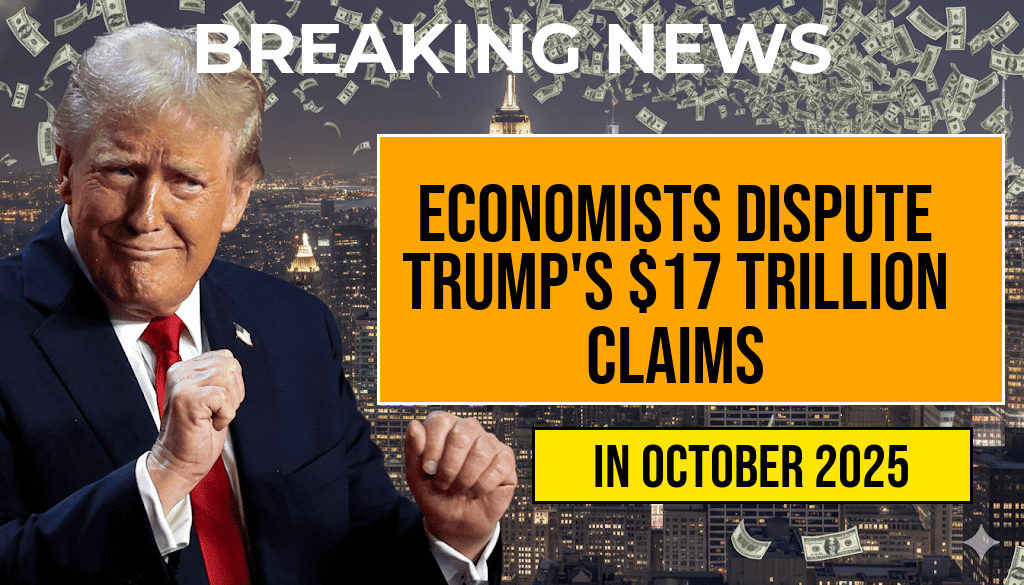In a contentious debate that reflects deep divisions among economists, claims made by former President Donald Trump regarding a $17 trillion global investment have sparked intense scrutiny. Trump asserted that his policies during his presidency led to this staggering figure in investments, which he argues could reshape the U.S. economy and boost job creation. Critics, however, have challenged the validity of these claims, arguing that they lack concrete evidence and rely on speculative projections. The dispute highlights not only differing economic philosophies but also the broader implications of investment strategies in a post-pandemic world.
Claims of Economic Impact
During an interview on a prominent news network, Trump emphasized that his administration’s tax cuts and deregulation efforts were pivotal in stimulating unprecedented levels of foreign and domestic investment. “We’ve seen incredible growth, and this $17 trillion is just the beginning,” he stated, suggesting that the investment would lead to millions of new jobs across various sectors. Supporters of Trump argue that his policies indeed created a favorable environment for business expansion and investment.
Debate Among Economists
The economist community is divided on the legitimacy of Trump’s investment claims. Some experts, particularly those aligned with conservative economic principles, support the notion that lower taxes and deregulation can drive significant investment. They point to statistics from the Forbes that show increased capital spending during Trump’s presidency as evidence of a positive investment climate.
Critiques and Counterarguments
In contrast, many economists from a more progressive background argue that Trump’s claims are exaggerated and lack empirical support. They highlight the following points:
- Overestimation of Job Creation: Critics argue that the projected job numbers are inflated and do not account for the potential negative impacts of economic policies.
- Global Context: Some economists assert that the investment landscape is influenced by numerous global factors, including international trade agreements and emerging markets, rather than solely by U.S. policies.
- Long-Term Sustainability: Concerns are raised about whether such levels of investment can be sustained in the long run, especially post-COVID-19.
Investment Trends Post-Pandemic
The pandemic has dramatically reshaped investment trends, with many companies pivoting to digital platforms and sustainable practices. According to a report by the Brookings Institution, global foreign direct investment (FDI) fell sharply in 2020 but is showing signs of recovery. The report emphasizes that while investments are rebounding, they are increasingly focused on technology and sustainable practices rather than traditional sectors.
Future Economic Outlook
As the U.S. economy continues to recover, the discourse surrounding investment will likely evolve. Economists predict that the focus will shift toward how investments can be more equitable and sustainable, especially in light of growing concerns about climate change and economic inequality. The potential for a $17 trillion investment could serve as a catalyst for discussions on redefining economic priorities.
Conclusion: A Divided Economic Narrative
This clash over Trump’s $17 trillion investment claims underscores a broader narrative within the economic community about the effectiveness and sustainability of different economic policies. As the nation navigates the complexities of recovery from the pandemic, the dialogue surrounding investment will play a crucial role in shaping future policies. Economists will continue to analyze the implications of these claims as both sides present their evidence, reflecting the ongoing debates about the best paths forward for economic growth and stability.
Frequently Asked Questions
What is the main topic of the article regarding Trump’s claims?
The article discusses the disagreement among economists over former President Trump’s assertion that his policies could lead to a $17 trillion increase in global investments.
What are the differing perspectives of economists on Trump’s investment claims?
Some economists believe that Trump’s claims are overly optimistic and unsubstantiated, while others argue that his policies could indeed spur significant foreign investment.
What specific policies are associated with Trump’s investment claims?
The article highlights several economic policies implemented during Trump’s administration, including tax reforms and deregulation, which proponents argue could attract global capital.
How do critics respond to the $17 trillion investment projection?
Critics argue that the projected figure is unrealistic and not backed by substantial data, suggesting that it may be more of a political statement than a feasible economic forecast.
What implications could Trump’s claims have on future economic policies?
If Trump’s claims are taken seriously, they could influence future economic policies aimed at attracting investment, but they also risk misguiding policymakers if not grounded in realistic projections.

Leave a Reply